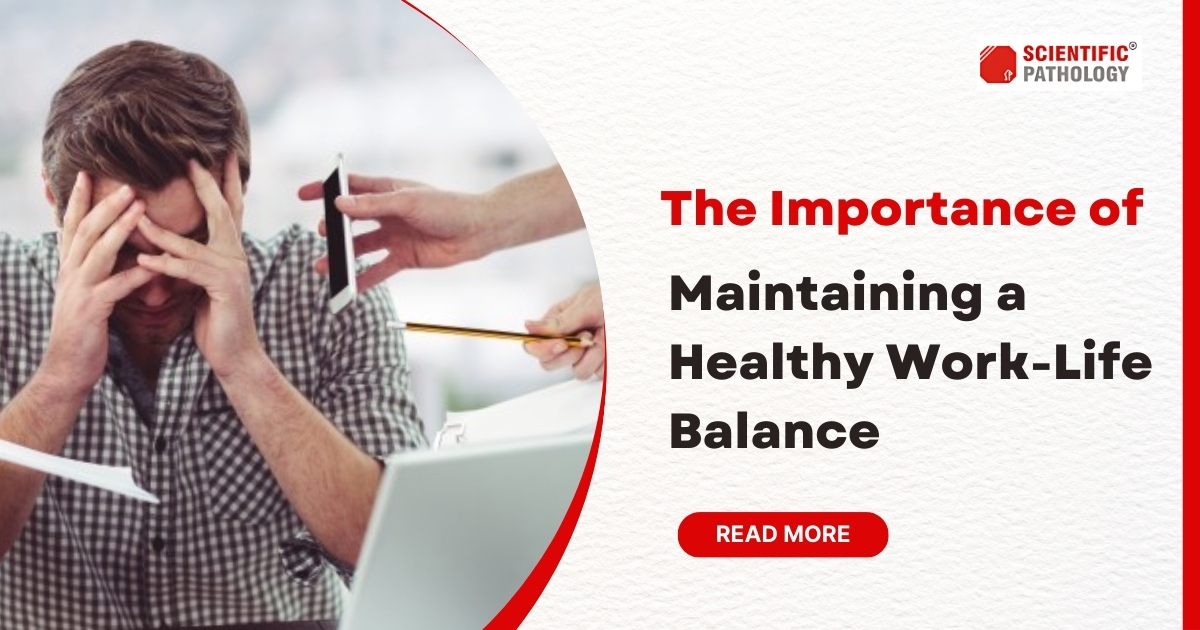The Importance of Maintaining a Healthy Work-Life Balance
The Importance of Maintaining a Healthy Work-Life Balance
Maintaining a healthy work-life balance is more than a lifestyle choice; it’s essential for our physical health, mental well-being, and job satisfaction. At *Scientific Pathology*, we believe that supporting a balanced work-life dynamic helps create a more productive, motivated, and innovative workforce. In today's world, where technology blurs the lines between professional and personal time, achieving balance has become more challenging yet more critical than ever.
Why Work-Life Balance Matters
With the onset of COVID-19, the idea of a balanced work-life routine gained new relevance, especially as many employees experienced higher demands on their time and energy. Balancing work and personal life isn't just about managing stress levels but also about enhancing satisfaction in both domains, which leads to better performance and happier employees. Let’s explore why work-life balance is so crucial and how individuals and organizations can work together to promote it.
Key Determinants of Work-Life Balance
Individual Factors
Personal attitudes toward work play a significant role in defining one’s work-life balance. Individuals who identify as perfectionists or overachievers often push themselves to work longer hours, sometimes at the expense of their personal time. Other individual factors, such as health, resilience, career stage, and even gender, play into how people manage their time and prioritize their commitments.
For instance, overworking can be both a personal and a professional detriment, as it leads to burnout, decreased job satisfaction, and strained personal relationships. Understanding personal limits and finding fulfillment outside work are essential to achieving balance.
Organizational Factors
While individual habits are crucial, the organization’s culture plays a significant role as well. Factors such as workload expectations, organizational culture, and flexible policies impact employees' work-life balance. Demanding workloads, inflexible schedules, and an expectation of constant availability create stress and make it difficult for employees to disconnect from their work responsibilities.
Balancing Family and Work Responsibilities
For many, home responsibilities add another layer of complexity to achieving a healthy balance. Working parents and caregivers face unique challenges, as they juggle professional commitments with the demands of family life. The pandemic intensified these challenges as many homes doubled as workplaces, creating even more blurred boundaries.
To support employees, organizations should acknowledge these pressures and encourage open communication about the need for balance. At *Scientific Pathology*, we emphasize understanding and empathy, knowing that flexibility around family needs can make all the difference for employee satisfaction.
Indicators of a Healthy Work-Life Balance
Work-life balance is both subjective and objective. While employees may feel balanced, external indicators—such as family satisfaction, personal health, and even feedback from colleagues—can also provide insight into the real state of balance.
Signs of a balanced work-life dynamic include:
- Enhanced Productivity: Employees are more productive when they can focus on their work during work hours and enjoy personal time outside of those hours.
- Improved Mental Health: A balanced life reduces stress, anxiety, and burnout, contributing to better mental health and workplace morale.
- Stronger Relationships: Employees who have time for family and friends build stronger relationships, which contributes to their overall well-being.
Conclusion
The pursuit of a healthy work-life balance is essential, not only for individual well-being but also for organizational success. As workplaces continue to evolve, understanding and respecting the need for balance will remain crucial. At *Scientific Pathology*, we’re committed to creating a workplace where balance is not just a goal but a standard, allowing our employees to thrive both inside and outside of work. Together, we can foster a happier, healthier, and more productive workplace.




